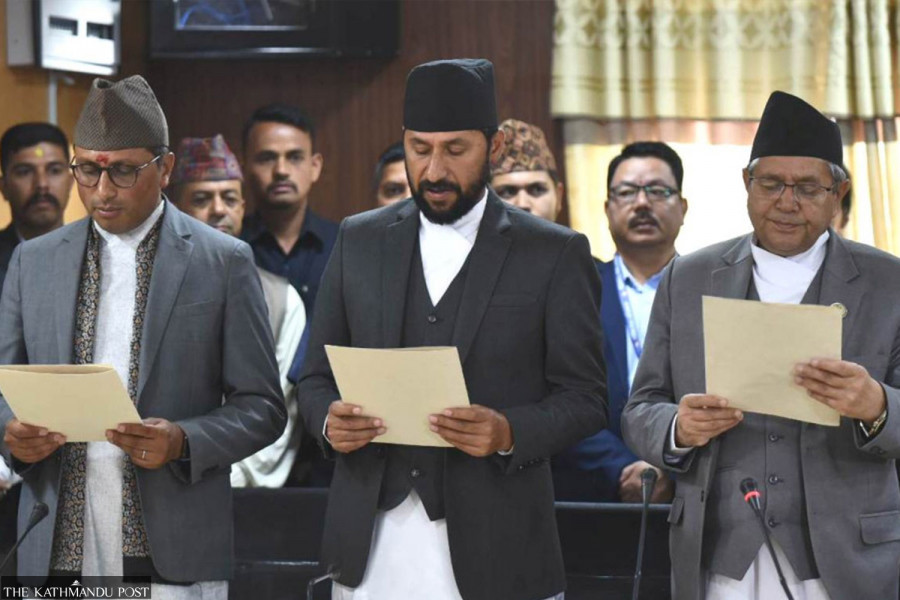Columns
Opportunism and sacrifice in politics
The contest between the older parties and the newbies is one between stagnation and kinetics.
Avasna Pandey
The impressive show put by the Rastriya Swatantra Party (RSP), winning two out of the three seats contested in the recent by-elections, has once again solidified its image as a viable alternative to the old political forces that never seem to mend their ways. There were little doubts about Rabi Lamichhane’s ability to save the seat he had lost due to a Supreme Court order concerning his citizenship, for there was no way the people would bypass him for other candidates just five months after his thumping win. But Swarnim Wagle’s emergence as a redoubtable leader of Tanahun-1 less than a month after he left the Nepali Congress, where he had no defined role anyway, to join the RSP to contest the constituency vacated by a (formerly) top Nepali Congress leader has put to rest the criticism that he was just a political opportunist.
Wagle’s victory has cemented the claim he made during his break-up with the Congress that there was no time to waste as he had come with a limited time for active politics. His statement seems to have rung true for the Tanahun voters who, like almost all Nepalis, are now tired of waiting for things to change on their own. After all, we are a young democracy with young demographics, and we have a very small window to improve our economic and social indicators before turning into an ageing country. The fact that the Nepali population in the 2021 census showed the lowest growth in eight decades indicates that we have much to catch up before we turn old. And the political gamble that Wagle took, just as many young leaders who joined the RSP in the run-up to the 2022 general elections did, has seems to have paid off.
One of the important takeaways of the November election in 2022 followed by the by-election last week is that displaying allegiance to a single party for many decades has ceased to become a marker of political sacrifice. Hunger for power until reaching the deathbed has been guiding politicians of the established parties and the cadres have internalised that notion. And it is this very notion that the political newbies have debunked—the culture of political patronage. Young people have access to the global world. Young voters have a much wider outlook and are thus deciding on their own. There is little substance in the high-pitched claims of the middle-aged leaders of the old parties that leaders need to sacrifice their decades for the party as whole timers. Such long waits just validate the patronage culture rampant in the old parties that have little enthusiasm to work for the country anymore.
Breaking the mould
For too long, the same individuals who rely on the patronage-based system to uphold their status within the party have held our political parties captive. But democracies yearn for political competitiveness as it is the antidote to patronage. The playing field is levelled, and the power of vested political elites is diminished when positions and rewards are granted on the basis of merit rather than political allegiance. The degree to which a political system encourages competition and forgoes favouritism has substantial ramifications for democracy.
Frequent formation and dissolution of coalitions have become the norm. These coalitions are not based on shared ideology or working agenda, but on strategic calculations regarding the distribution of seats prior to elections. There is much opportunism in those partnerships as much as anyone wanting to run for elections based on the assumption that they would be getting a ticket from a certain party. And while the country has been witnessing such political practices for some time now, it is hypocritical to expect moral ground from others but not apply the same to oneself. The recent political events in Nepal are reminiscent of what American political sociologist Seymour Lipset said in his book Political Man that democracy is not just a political system, but also a cultural one. Lipset argues that the values, beliefs and attitudes of a society influence its political behaviour and the functioning of political institutions.
Politicians often debate, overtly or covertly, whether party leaders should keep making sacrifices and remain in the party, as well as whether they should move quickly because their active years are limited. Opportunism and sacrifice are two subjects that frequently clash. Opportunism, or using a situation to your advantage in order to further your own interests, is sometimes seen negatively. Sacrifice, or giving up something valuable for the benefit of others, is celebrated. However, rarely are things so clearly categorised into this and that, and frequently, a variety of circumstances combine to influence people’s behaviour.
While opportunism and sacrifice may seem like opposites, they are not necessarily mutually exclusive. In fact, many politicians try to maintain a delicate balance between the two, using their opportunistic skills to advance their agenda while also making sacrifices for the greater good. For example, former United States president Barack Obama gained a reputation for being able to manoeuvre through tricky political situations and make calculated choices that advanced his political agenda while also making concessions and sacrifices for the greater good. He pushed to pass the Affordable Care Act, for example, which was a significant accomplishment for his administration but also required making concessions to rival political parties and interest groups.
Obama also showed both opportunism and sacrifice when he decided to approve the operation that killed Osama bin Laden. Obama’s reputation as a forceful and decisive leader was enhanced by the operation, on the one hand. On the other hand, the decision to order the mission was controversial and meant incurring major risks and perhaps risking American lives.
Politics, like many other spheres, requires a delicate balance. When political decisions are solely guided by opportunism, it can lead to a lack of transparency and accountability, eroding public trust and weakening democratic institutions. However, excessive sacrifices can result in a loss of political power and influence, making it challenging for politicians to fulfil their promises and achieve their objectives. In order to effectively serve their constituents and advance the common good, politicians must strike a balance between opportunism and sacrifice. Ultimately, the goal of politics is to serve the public interest, and this should guide their decisions.
A social scientific theory called rational choice theory states that people make choices based on logical calculations that align with their personal objectives. Political scientists have applied this theory to explain why people vote, join political parties and take part in other political activities.
Degree of competition
Political competitiveness refers to the degree of competition between political parties or candidates in an electoral system. It is influenced by factors such as the number of political parties, the level of political polarisation and the degree of voter turnout. In the context of political competitiveness, rational choice theory suggests that individuals are more likely to engage in political behaviour when they perceive that their participation can influence the outcome of the election and when they perceive that the benefits of such behaviour outweigh the costs.
Young democracies like ours exhibit typical characteristics of parties being led by a small coterie of leaders and lacking transparency. Despite the appearance of political competitiveness in Nepal’s multiparty system, in reality, the same people who are well-connected to the power centre tend to receive tickets for elections. The 2022 elections were least ideologically charged with none of the political leaders discussing agenda but rather concentrating on which political party or which coalition they would be contesting the election from. Rather than engaging in public debates and discussions to present their policies and ideas to voters, the focus in the last election was on securing a ticket from a favoured coalition. As a result, the kind of competition that is essential for ensuring accountability, responsiveness and representation in a democracy was lacking, and patronage-based politics was leading to corruption, nepotism and other forms of abuse of power being entrenched.




 20.53°C Kathmandu
20.53°C Kathmandu















